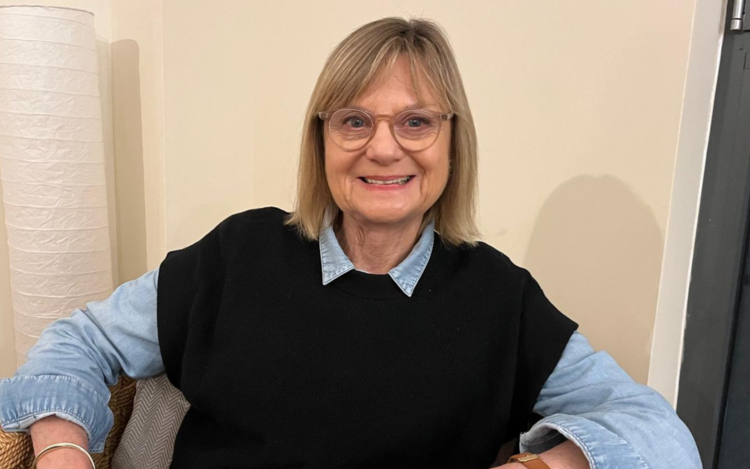
This article is part of a series of profiles of key figures who have shaped social work over the past five decades, to mark Community Care’s 50th anniversary. Previous interviewees include Brid Featherstone, David Howe, June Thoburn, Eileen Munro and Herbert Laming.
Marian Brandon’s social work journey began in a way familiar to most practitioners, with a desire to make a difference.
After graduating in law in the mid-1970s, she began working in a residential home for young people, her goal of joining a law firm soon shifting to a passion for child protection, leading her to qualify as a social worker in 1980.
It was in the 1990s that Brandon’s acclaimed research career began, under the mentorship of Professor June Thoburn, whom she still lathers with praise.
She has since contributed valuable insights on child protection, neglect, children’s views of abuse, domestic abuse and on working with fathers.
But perhaps her most famous role was directing national analyses of serious case reviews – now known as local child safeguarding practice reviews or child practice reviews – in England and Wales covering cases from the late 1990s up to 2017.
It was a project influenced by a curiosity over the child death enquiries that found national fame compared to those that got quickly forgotten.
Brandon embarked on a decade-long journey to note the patterns, pinpoint the lessons, find the outliers, and help the sector move forward in a meaningful way.
Speaking to Community Care seven years on from the final review that she analysed, Brandon touched on the legacy of her reviews, the lessons she tried to disseminate and the subtle complexity of neglect in child deaths.
How was your experience practising as a social worker in the 1980s compared to today?
I think had more autonomy than social workers do now. There was a child whose mother lived far away and wasn’t safe to look after him. I used to drive him to have contact with her regularly because I thought it was a great way to get to know him.
I also got to maintain contact with [the mum] and see how she was doing. I had the time to do that then but I’m not sure social workers would do so much now.
Practitioners are time and resource-poor, and so have become more distanced from families. To an extent, they have lost their sense of compassion and become more defensive.
That defensiveness and the anxiety around being unable to do the job properly can affect their attitude towards families. I have always stressed to students how important it is to approach families with kindness.
You might have to make difficult decisions the family disagrees with, but you should be kind and respectful. When people are under huge pressure that can get lost.
But the work is very emotionally difficult and workers don’t always get the support they should. Without fully staffed teams and [the resources and time] to do some preventative work, it’s very difficult to do the job properly and act with empathy, compassion and understanding.
How did your analyses of serious case reviews begin?
The headline reviews at the time – for example, for Jasmine Beckford and Maria Colwell – were about children aged five, six or seven. I thought, ‘Well, how typical are these big cases compared to others where things went wrong?’.
Previous analyses of serious case reviews were only on a small sample of cases. So when we got the first commission from the Department for Education and Skills (DfES), I was very keen to capture all the reviews to pinpoint the similarities, differences and outliers.
We had a real struggle getting all the reviews but we did get a lot. We had basic information on every review and then chose a sub-sample to study in depth.
Celebrate those who’ve inspired you
For our 50th anniversary, we’re expanding our My Brilliant Colleague series to include anyone who has inspired you in your career – whether current or former colleagues, managers, students, lecturers, mentors or prominent past or present sector figures whom you have admired from afar.
Nominate your colleague or social work inspiration by either:
- Filling in our nominations form with a letter or a few paragraphs (100-250 words) explaining how and why the person has inspired you.
- Or sending a voice note of up to 90 seconds to +447887865218, including your and the nominee’s names and roles.
If you have any questions, email our community journalist, Anastasia Koutsounia, at anastasia.koutsounia@markallengroup.com
Each review felt like an important tribute to the child as a person: [the opportunity] to see them individually, in their family context and not just as the big case that hits the national headlines.
I’ve always done this research as part of a team and researchers didn’t want to work on it full-time – it was too upsetting. We always ensured researchers were working together so we could talk to each other about what we’d just read.
Did it ever take a toll on you?
Towards the end, I found it harder to read and go through the reviews. That was when I decided to stop. So I think, yes, they did take a toll.
I remember one time, I was told by a civil servant that the records needed to be put in the shredder afterwards. And I was crying while I was shredding them.
I thought, ‘This is the last information about these children. No one else will come back and find out about their lives.’
What key lessons did you draw from analysing serious case reviews?
In the first serious case review study, for Wales, what came through was professionals not challenging [decisions] when they thought something was wrong.
But to do that, you’ve got to be confident that you’re not going to make things worse, which is tricky.
I have made a point of trying to challenge unsafe practice as a lecturer working with social work students on placement – for example, when a case was closed when risks of significant harm to a child were not resolved and families were no longer getting support.
However, this was possible because I had good enough relationships with the students and their supervisors and managers.
I could discuss my concerns and follow up what decisions were made subsequently without feeling that things would get worse. From the reviews, what came across was that workers felt able to do this when they had good relationships and were well supported and supervised.
So that was an abiding lesson that stuck with me, and that’s a theme that’s come through all of the reviews from the 1990s till 2017 [my last review].
Are there any other themes that persisted over the years?
The family [that ends up in the review] looks like other families on a social worker’s caseload. So how do you tell the difference between a family where things can go wrong and one where, it might not be perfect, but the child won’t be harmed?
That comes back to knowing the family well enough to see the signs. Because things often slip quite quickly.
Neglect was also a background factor in most of the cases but was rarely the primary cause of death or harm.
Interestingly, when practitioners classified a case as neglect they sometimes failed to see what else was happening.
In one case, there’d been numerous section 47 enquiries about physical abuse – and the child did die of physical assault – but it was thought of as a neglect case and so it was treated as one.
So we should be aware that neglect can be a flag for other things happening.
You ended up doing an analysis of neglect in serious case reviews from 2003 to 2011. What is something that struck you?
Dr Ruth Garner for the NSPCC was part of the team in the early studies and she came up with the term ‘start again syndrome’.
Looking at the cases, we often found that practitioners, in an attempt to think the best of the family, particularly when there was a new baby, would say, ‘Put away these big, fat files. We won’t look at those. We’ll just start again. This new baby gives the family a fresh start.’ And it was with the best intentions.
But you need to understand how the family has gotten here. Things might be assumed to be better now but they might not be. Assessments need to happen repeatedly and that could be forgotten about.
In one case, a young mother was a drug misuser but was desperate to be a good parent. She was pregnant and always turned up for her drug test – but most of them were positive. So the worker said, ‘She’s so co-operative, she wants to be a good mum. She really is trying her very hardest.’
But, sadly, she wasn’t succeeding. She wasn’t off the drugs and it was still dangerous.
They said they didn’t want to be judgmental but, as a social worker, you do have to judge whether this person is a safe enough parent. It’s about judging in a way that’s fair and compassionate to all sides.
You have previously talked about ‘the normalisation of neglect’. What are the repercussions of that?
I think neglect sometimes stops practitioners from understanding what’s going on because it seems to be everywhere. What we tried to do in our serious case review work was ask, ‘What kind of neglect is it?’.
Neglect muddles practitioners’ thinking. You need good supervision on neglect cases to try and disentangle what it means and what may hide behind it, and see things more clearly. How is the impact manifesting on the child?
I hope the legacy of our serious case review work is to remind practitioners to hold steady in confusing, overwhelming cases, and instead of just saying, ‘It’s everywhere,’ to ask themselves, ‘What’s it like in this family, in this case, for this child?’.
How effective are current safeguarding practice reviews in helping practitioners learn lessons?
I think it’s really hard to learn from the worst cases. Hard cases make bad laws and encourage fearfulness.
I think it would be better to learn from when things go well.
I remember asking a director of children’s services in an area that had consistently done well how they maintain this progress. She said, ‘We don’t make a huge fuss when things go wrong’. They did their learning from what works.
Safeguarding reviews are helpful when they provide recommendations that improve everyday practice. But I think they’re more efficient when shorter and more to the point, which is the current direction of local child safeguarding practice reviews.
What are your hopes for the future?
I do feel more hopeful than I would have, say, a year ago.
But I think social workers need to feel hopeful and they need to feel that they can do the work that they’re trained for, and carry on putting relationships at the heart of what they do.
Maltreatment is relationships gone wrong, so the best way to understand and help maltreatment is to understand relationships and use relationships to help people function better.







 Bournemouth, Christchurch and Poole
Bournemouth, Christchurch and Poole  Hampshire County Council
Hampshire County Council  Oxfordshire County Council
Oxfordshire County Council  South Gloucestershire Council
South Gloucestershire Council  Wokingham Borough Council
Wokingham Borough Council  Webinar: building a practice framework with the influence of practitioner voice
Webinar: building a practice framework with the influence of practitioner voice  ‘They don’t have to retell their story’: building long-lasting relationships with children and young people
‘They don’t have to retell their story’: building long-lasting relationships with children and young people  Podcast: returning to social work after becoming a first-time parent
Podcast: returning to social work after becoming a first-time parent  How managers are inspiring social workers to progress in their careers
How managers are inspiring social workers to progress in their careers  Workforce Insights – showcasing a selection of the sector’s top recruiters
Workforce Insights – showcasing a selection of the sector’s top recruiters 

 Facebook
Facebook X
X LinkedIn
LinkedIn Instagram
Instagram
I’ve learnt and gained more insight into how I work and about the families I work with from this than in 4 years of ‘supervision’. Thank you Community Care and Professor Brandon. That said I think it is still underestimated how frightened most social workers are of “getting it wrong”. That’s not just about doubting our skills but about how fear now seems to be a tool of management and general social worker leaders. Fear if we’ll still have jobs when “efficiency” is the buzzword and increasingly AI chipping away at our autonomy for supposedly more informed decision making, fear that at any moment we can be referred to SWE for FtP investigations that can drag on for years, fear of bullying, fear of raising issues having seen colleagues victimised for doing so and our generalised anxiety that our managers far from being supportive are motivated to show how “tough” they are by pointing fingers at our supposed failings. Fear and anxiety permeate the thinking of most social workers I know. It used to be even in my relatively short career that if your supervisor saw you were upset or walked past your car and saw you crying they would stop and show compassion. I wouldn’t dare display vulnerability for fear of being labelled weak and not coping. When did it become ingrained in managers to respond to us with “social work isn’t for everyone” rather than helping us navigate the difficulties in our work? Anyway thank you for this.
The workplace for Social Work has become toxic and uncaring
I don’t think we will ever read a better description of how morally and professionally bankrupt the pretence to commitment to continieus professional development we are fed by our managers, directors and SWE than this elequent contribution by Nat. Our ‘Leaders’ should hang their heads in shame at the reality of our interactions with our supervisors. Dread and terror are not exaggerations any longer but our daily experience. It wasn’t always like this as Professor Brandon describes too and my own experience of increasing demoralisation since qualifying in 1984 shows.
If managers are unable to fully look after and support their Social Work staff you surely have to question the same managers’ motivation and ability to look after and support the vulnerable children and adults who come to the attention of Social Care agencies?
No more the of old care and compassion which is now perceived as getting in the way of targets and budget calculations. In contemporary social work infested with MBA learnt zealotry about “value for money”, “strong leadership values’, “shaping the team”, “focusing on goals”, “vision”, “meeting organisational priorities “and the rest the priority is always what the organisation demands. This is why if a social worker is misguided enough to stray into framing their thinking on professional values they risk being seen as not performing well and worse as not being a “team player”.